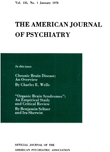An Unexpected Result of Psychosis in Marriage
Abstract
In the course of a marriage research project, 44 couples were studied in which one spouse had been diagnosed as psychotic. Dispelling the commonly held assumption that the marriages of psychotic individuals are always chaotic and unrewarding, many couples reported feelings of love and mutual understanding growing out of the psychotic experience and their attempts to deal with it. This unexpected finding has important treatment implications: it suggests that the nonpsychotic spouse should be actively engaged in the psychiatric treatment process and that the psychosis can be effectively dealt with as a marital crisis.
Access content
To read the fulltext, please use one of the options below to sign in or purchase access.- Personal login
- Institutional Login
- Sign in via OpenAthens
- Register for access
-
Please login/register if you wish to pair your device and check access availability.
Not a subscriber?
PsychiatryOnline subscription options offer access to the DSM-5 library, books, journals, CME, and patient resources. This all-in-one virtual library provides psychiatrists and mental health professionals with key resources for diagnosis, treatment, research, and professional development.
Need more help? PsychiatryOnline Customer Service may be reached by emailing [email protected] or by calling 800-368-5777 (in the U.S.) or 703-907-7322 (outside the U.S.).



